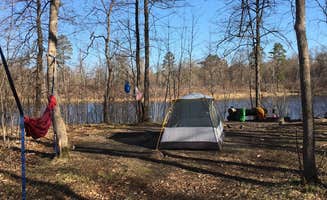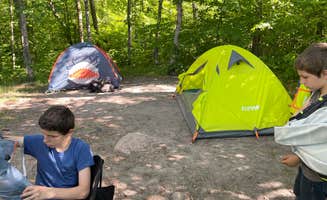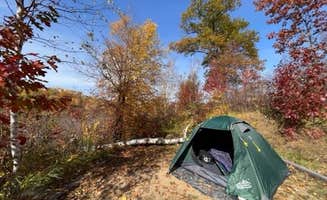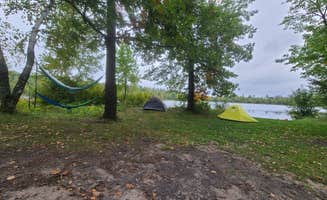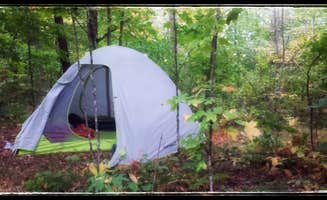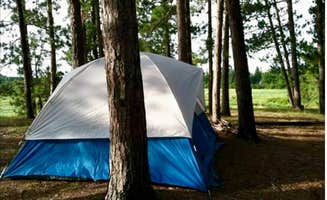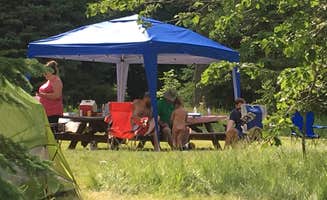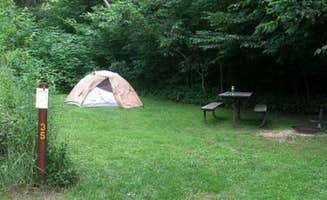Tent campsites near Park Rapids, Minnesota sit within the Pine Moraines and Potholes ecosystem, characterized by glacial drift deposits that formed the hilly terrain and countless lakes throughout the region. Winter temperatures regularly drop below 0°F, while summer highs typically reach 75-85°F with occasional humidity. Primitive camping areas in this region receive between 25-30 inches of rainfall annually, creating ideal conditions for the pine and hardwood forests.
What to do
Hiking the North Country Trail: The region offers multiple access points to this national scenic trail. At DeSoto Lake Backpacking Sites, you can explore miles of interconnected trails. As one camper noted, "From these camp sites you can portage into several nearby lakes that are even more remote and pristine, or you can hike miles in any direction either on the NCT, or in several state park trails that intersect nearby."
Paddling pristine lakes: Many sites offer direct water access for canoes and kayaks. At Lake Twentyone Watercraft Site, "This watercraft campsite is right in the water with a rustic access for your canoe or kayak, not far from the actual landing and parking lot... Small unmotorized lake makes for a quiet and peaceful stay."
Wildlife viewing: The backcountry lakes provide excellent wildlife observation opportunities. At Deer Park Lake Backcountry Campsite, one camper reported, "I stayed for 2 nights. it was beautiful and serene... Woke up to trumpeter swans each day. Loved it. There is a little trail that brings you down to the lake to view the bird life."
What campers like
Solitude in backcountry settings: The remote tent campsites allow for peaceful experiences even during peak season. A camper at Iron Corner Lake Remote Backpacker Site shared, "Most campers at Itasca head for the main campgrounds for standard tent and RV camping...but for a near Wilderness experience, there are 11 remote backpacker campsites which are between 1 and 6 miles trek into the roadless wilderness area of the park."
Easy access to multiple outdoor activities: Sites often connect to various recreational opportunities. As one camper at Gulch Lake mentioned, "Not only is it connected to the North Country Trail but there is also a beautiful trail around Gulch Lake that is connected to the north side of the campground just past Spot 1."
Unique campsite features: Many sites have distinctive characteristics. At Halverson Trail Camp, a visitor wrote, "Very nice area with a water access, fire pit and outhouse. About a 10-15 min drive from main road and there are more campsites to find further in."
What you should know
Weather preparedness: Northern Minnesota experiences significant seasonal variations. A camper at Deer Park Lake noted, "I was also able to get internet so I was able to see a big storm coming. The birds and insects were suddenly silent and the clouds came in fast. I was able to check weather apps and go to the shelter a mile toward the parking lot and wait out the storm."
Water availability and quality: Most backcountry sites require water filtering. "The campsite is basic. A log to sit on, a fire ring, and spots for 2 or 3 tents. The campsite overlooks a lake. Water is weedy, but is filterable for boiling water," reported a Deer Park Lake visitor.
Access challenges: Some sites can be difficult to locate. A visitor to Gulch Lake noted, "It can be difficult to find down an old rickety road, I would suggest getting there with plenty of light so you can locate the grounds."
Tips for camping with families
Choose sites with diverse features: Look for campgrounds with multiple amenities. At Lake Twentyone, "Sites are primitive. No electric or water. Toilets are vault toilets, no showers. Stayed at a nice waterfront site great for having kayaks and paddle boards. Enough space for a few small tents and trees for hanging hammocks."
Consider distances for younger hikers: Some backcountry sites require significant hiking. At Gardner Lake Campsite, a visitor reported, "It was a 2.5 mile hike of all sorts of terrain. Scenery was perfect. Not much for available tent sites or hammock sites. It could fill up fast."
Bear awareness: Bears are present in the area. A camper at Deer Park Lake mentioned, "There is a bear box which was helpful to store food and supplies since I was Hammocking." Always store food properly and teach children about wildlife safety.
Tips from RVers
Access limitations: Most tent campsites near Park Rapids have limited or no RV access. At Frames Landing Campsite, one visitor observed, "Although there is a dirt road access, in dry weather you could get an RV into the campground if you dont mind no hookups. It would be a good place to stay before launching a canoe trip."
Road conditions: Forest roads can be challenging for larger vehicles. A Gulch Lake visitor warned, "The road can also be pretty tough so be prepared if your pulling a trailer."
Alternative uses for RVers: Some campgrounds work well as base camps for day activities. "It would be a good place to stay before launching a canoe trip. Plenty of fire wood provided as part of your campsite fee," noted a Frames Landing visitor.


